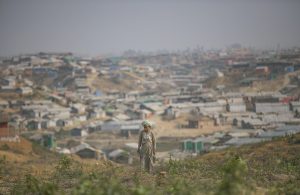The United Nations and the government of Bangladesh have agreed to work together to provide support to Rohingya refugees who have been relocated to the windswept island of Bhasan Char in the Bay of Bengal.
In a statement on Saturday, the United Nations High Commissioner for Refugees (UNHCR) announced that the two sides had reached an agreement that would grant the agency access to the l0w-lying island, which will allow it to help provide services and protection for the 19,000 people living there.
Bangladesh is home to more than 1 million Rohingya Muslims, most of whom were forced over the border by fierce assaults by Myanmar’s military in 2016 and 2017, acts which U.N. investigators later claimed showed “genocidal intent.” In a bid to reduce the pressure on the refugee camps around Cox’s Bazar, the Bangladeshi government began moving people to Bhasan Char, or “floating island,” a previously uninhabited island around 34 kilometers offshore, in December 2020.
The new agreement therefore marks something of a turnaround for the UNHCR, given that U.N. officials and other humanitarian groups criticized the remoteness of the island and its vulnerability to cyclones and other extreme weather events. At the time of the first transfers to the island, rights groups also alleged that people had been coerced into moving there.
In May, the U.S.-based NGO Refugees International published a report stating that the Bhasan Char relocation plan “reflects the shift toward a policy more akin to detention than refuge.” In May, during a visit by senior UNHCR officials to the island, 4,000 people held protests that involved clashes with the police. Given the lack of jobs, increasing numbers of people are paying people smugglers to move them away from Bhasan Char.
In its statement, UNHCR statement said that it held discussions with the Rohingya refugees in Cox’s Bazar, as well as those already on the island, prior to signing of the agreement. “These cover key areas of protection, education, skills-training, livelihoods and health, which will help support the refugees to lead decent lives on the island and better prepare them for sustainable return to Myanmar in the future,” the statement said.
The UNHCR described the agreement as an expression of the Bangladesh’s “generosity and support toward the Rohingya population until they can return safely and sustainably to Myanmar.”
According to Bangladesh refugee commissioner Shah Rezwan Hayat, “Bhashan Char residents will receive similar treatment, humanitarian response-wise, to what is now provided to people in the Cox’s Bazar camps.” Bangladeshi officials have confirmed that they intend to send 80,000 more Rohingya refugees to Bhasan Char after the end of the monsoon next month.
The memorandum of understanding is a pragmatic recognition by UNHCR that whatever its shortcomings, the Bhasan Char relocation plan is now a fait accompli and that the best thing it can do is to ensure that the island becomes at least moderately hospitable to the people who are relocated there.
But the deal also highlights the challenge that the Bangladeshi government faces in coming up with a long-term solution to the refugee crisis with which it has been burdened. Already slim prior to the Myanmar military’s seizure of power in February, the chances of achieving the preferred option – voluntarily repatriating refugees from Cox’s Bazar back to Myanmar’s Rakhine State – appear to have narrowed to vanishing point.

































